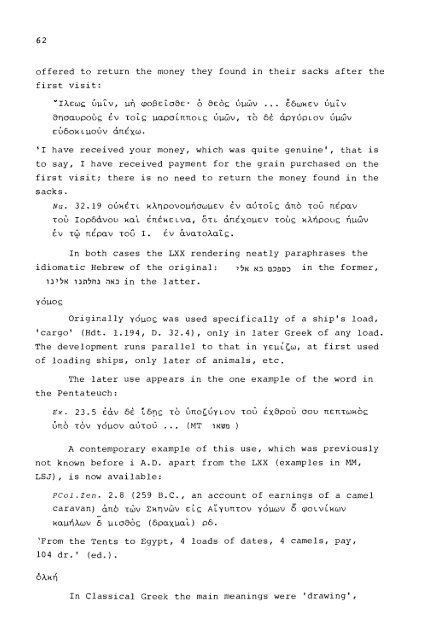A Lexical Study of the Septuagint Version of the Pentateuch
A Lexical Study of the Septuagint Version of the Pentateuch
A Lexical Study of the Septuagint Version of the Pentateuch
Create successful ePaper yourself
Turn your PDF publications into a flip-book with our unique Google optimized e-Paper software.
<strong>of</strong>fered to return <strong>the</strong> money <strong>the</strong>y found in <strong>the</strong>ir sacks after <strong>the</strong><br />
first visit:<br />
"Ιλεως ύμΐν, μη φοβεΐσθε· ό θεός υμών ... εδωκεν ύμΐν<br />
θησαυρούς έν τοις μαρσ ι ΤΧΤΤΟ ι ς υμών, τό δέ άργύριον υμών<br />
ευδοκιμούν απέχω.<br />
'I have received your money, which was quite genuine', that is<br />
to say, I have received payment for <strong>the</strong> grain purchased on <strong>the</strong><br />
first visit; <strong>the</strong>re is no need to return <strong>the</strong> money found in <strong>the</strong><br />
sacks.<br />
Nu. 32.19 ούκέτι κληρονομήσωμεν έν αύτοΐς από τού πέραν<br />
τού Ιορδανού και έπέκεινα, δτι άπέχομεν τούς κλήρους ημών<br />
έν τω πέραν τού I. έν άνατολαΐς.<br />
In both cases <strong>the</strong> LXX rendering neatly paraphrases <strong>the</strong><br />
idiomatic Hebrew <strong>of</strong> <strong>the</strong> original: ι^κ Nn DOÛDD in <strong>the</strong> former,<br />
u't»K ιant»nj ΠΝ3 in <strong>the</strong> latter.<br />
γόμος<br />
Originally γόμος was used specifically <strong>of</strong> a ship's load,<br />
'cargo' (Hdt. 1.194, D. 32.4), only in later Greek <strong>of</strong> any load.<br />
The development runs parallel to that in γεμίζω, at first used<br />
<strong>of</strong> loading ships, only later <strong>of</strong> animals, etc.<br />
The later use appears in <strong>the</strong> one example <strong>of</strong> <strong>the</strong> word in<br />
<strong>the</strong> <strong>Pentateuch</strong>:<br />
Ex. 23.5 έάν δέ ΐδης τό ύποζύγιον τού εχθρού σου πεπτωκός<br />
ύπό τόν γόμον αυτού ... (MT INKTO )<br />
A contemporary example <strong>of</strong> this use, which was previously<br />
not known before i A.D. apart from <strong>the</strong> LXX (examples in MM,<br />
LSJ), is now available:<br />
PCol.Zen. 2.8 (259 B.C., an account <strong>of</strong> earnings <strong>of</strong> a camel<br />
caravan) από τών Σκηνών είς Αιγυπτον γόμων δ φοινίκων<br />
καμήλων δ μισθός (δραχμα'ι) ρδ.<br />
'From <strong>the</strong> Tents to Egypt, 4 loads <strong>of</strong> dates, 4 camels, pay,<br />
104 dr.' (ed.).<br />
όλκή<br />
In Classical Greek <strong>the</strong> main meanings were 'drawing',

















